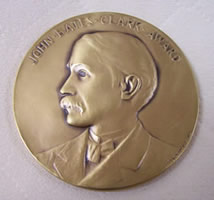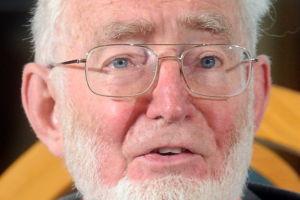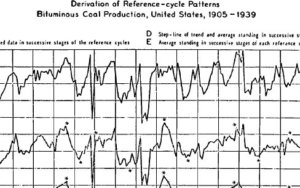At the end of World
 War II, the American Economic Association began seeking a way to stimulate, reward and publicize outstanding contributions to economic knowledge. An exploratory committee on honors and awards was set up. It surveyed the practices of 47 scientific, engineering and professional societies, ranging from chemists, geographers and psychologists to acousticians, actuaries and foresters. As a result, the AEA established two medals in 1947, one of them “to be awarded biennially to that American economist under the age of forty who is adjudged to have made a significant contribution to economic thought and knowledge.” That year, the first John Bates Clark medal was awarded to Paul Samuelson for his “extraordinarily penetrating contributions to the theory of employment, production, distribution, and value.”
War II, the American Economic Association began seeking a way to stimulate, reward and publicize outstanding contributions to economic knowledge. An exploratory committee on honors and awards was set up. It surveyed the practices of 47 scientific, engineering and professional societies, ranging from chemists, geographers and psychologists to acousticians, actuaries and foresters. As a result, the AEA established two medals in 1947, one of them “to be awarded biennially to that American economist under the age of forty who is adjudged to have made a significant contribution to economic thought and knowledge.” That year, the first John Bates Clark medal was awarded to Paul Samuelson for his “extraordinarily penetrating contributions to the theory of employment, production, distribution, and value.”
In its first 10 years of existence, the Clark medal was constantly challenged, almost discontinued three times. One of the numerous issues the nominating committee faced was with defining what counted as a “significant contribution to economic knowledge.” In 1957, when Kenneth Arrow joined Samuelson, Kenneth Boulding, Milton Friedman and James Tobin on the list of laureates, discontent had mounted so much that Morris Copeland, then president of the AEA, felt he had to address it. The problem was the concentration of the awards on a limited set of fields. In the 1956 Handbook, all laureates had reported micro and macro theory as their main field of interest, with statistical methods and monetary theory coming second. At the 1958 annual business meeting, Copeland complained that
“Purely deductive exercises … offer young men prompter and surer professional recognition than does any form of empirical research. … There is something wrong with the incentives under which economists work in the early stages of their careers. I believe that … steps should be taken to change these incentives so as to make studies that are both theoretical and factual more attractive than mere a priori model analysis inquiries.”
Copeland made no mystery about his strategy to promote empirical work. He wanted a reform of the AEA award system.
“For the incentives provided to younger men, it is the Clark medal that is immediately pertinent. We might have used this award to help to overcome the disadvantage of the laborious and time-consuming type of economic inquiry that combines precise reasoning with empirical investigation and to make it more attractive than most purely deductive theorizing, mathematical or otherwise. We might have done so, but we did not.”
The theory-applied balance issue was not new to the AEA. In 1945, the exploratory committee had already warned about the difficulty of choosing “whether emphasis should upon methodology, contributions to theory, or contributions to the verification of generalizations and propositions.” A new committee was appointed to examine possible amendment to the Clark medal. The choice was between discontinuing the Clark medal, maintaining it alone, or creating a new award. The committee sent out two identical sets of questionnaires, the first to former members of nominating committees, and the second to a set of young economists sampled from the Handbook. Their responses varied greatly. A majority (11 vs 7) of former committee members believed a reasonable balance between theoretical, empirical and policy work should be achieved through the Clark award only, but several agreed with Copeland that empirical work was being discouraged. One committee member wrote:

Opponents to the establishment of a new award also included 3 respondents who professed downright opposition to any kind of award, a growing trend among AEA members:

By contrast, younger economists overwhelmingly approved the creation of a new award (32 vs 3). One pointed out that if economics was gaining recognition from businessmen and the general public, it was because of its empirical contributions, and asked that the profession’s prestige system catch up with society. Many complained about the difficulty to get policy-oriented work published in top journals. “The best reward is the space in the American Economic Review,” one respondent hammered out. Other campaigned for the addition of economic philosophy and teaching to the contributions worthy of an award. The political context of the 1950s was also on many economists’ mind:

Those who had suggested retaining the JBC award also often pointed that proper theory-applied balance could take up to half a dozen years to achieve, which was a major reason for the committee to support the immediate creation of an additional medal. It was to be awarded in each even-numbered year to a young economist “concerned with the public policy implications of his work who has made an outstanding contribution through an effective combination of empirical research and theoretical work,” and named after Wesley Clair Mitchell.
In the meantime, the AEA executive committee had voted against the termination of the John Bates Clark award, and had chosen Lawrence Klein as the 1959 laureate. For the first time, a separate citation was issued, one that unsurprisingly emphasized that Klein “has insisted that theory be grounded in empirical facts.” The recommendation of the new honor committee was disregarded, and the Wesley Clair Mitchell medal was never awarded. Polled economists’ prediction proved accurate. It took a half dozen years before the combination of theoretical and empirical mastery was recognized (see Zvi Griliches, Dale Jorgenson or Daniel McFadden’s citations), and before empirical economists were more specifically picked out (Marc Nerlove). By the 2000s, a laureate whose work was not celebrated as outstanding “applied” economics had become the exception. Is it time for a theory medal for young economists?






